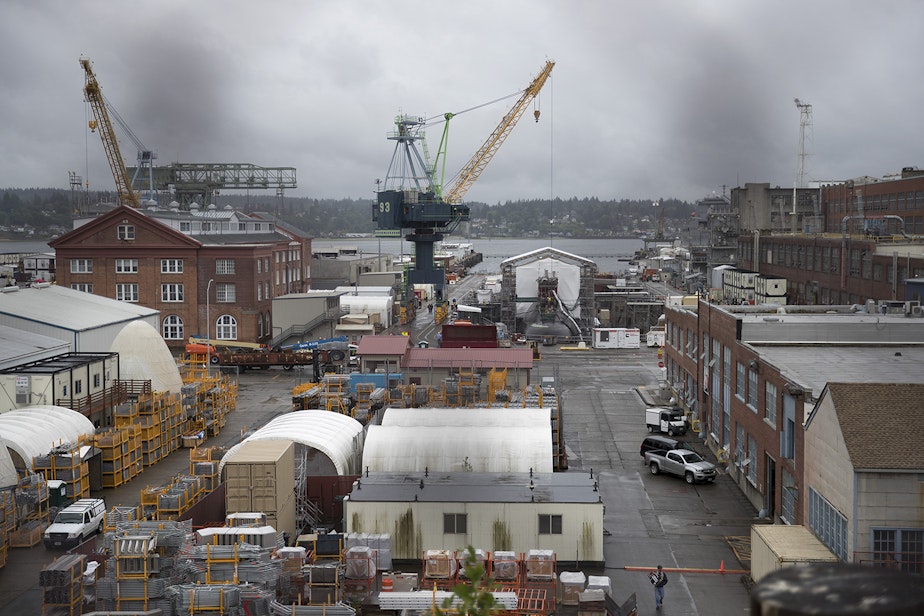Bremerton walks a fine line between encampment sweeps and available shelters

As homelessness grows around the region, communities struggle to keep up with spreading encampments.
In Bremerton, the largest city in Kitsap County, growing encampments have forced the city to reconcile with a lack of available shelter space throughout the county.
Last September, as complaints from residents grew, Bremerton city leaders passed an anti-camping ordinance to address growing encampments along Martin Luther King Jr. Way, Broadway, and 8th Street.
However, due to the landmark U.S. Supreme Court ruling in Martin V. Boise, the city couldn't conduct sweeps due to its lack of congregate shelter options.
At first, city leaders proposed designated camping lots on unused city parcels, along with a timed camping ban that would only take place at night. In the short term, the city landed on a modular shelter option proposed by the Salvation Army, which planned a modular transition that would make 75 overnight shelter beds available. After a few months of preparation, the Salvation Army doors opened on Nov. 1, and in anticipation, encampments were swept in the early hours of the morning.
"The idea was that we'll sweep everybody off the street and they can go into the shelter," said Kai Uyehara, who covers the City of Bremerton for the Kitsap Sun. "If anybody were not to comply, they would be guilty of a gross misdemeanor, and that would be punishable."
Homelessness outreach workers and service providers were hopeful those living in local encampments would make their way to the new Salvation Army shelter. From the first night going forward, around 40 people have occupied a bed on any given night. Service providers are still searching for close to 40 people who haven't been accounted for, and may have left the area altogether.
Sponsored
The latest point-in-time count, which seeks to track the number of unhoused people living outdoors, found that there were 245 unhoused people throughout Kitsap County.
While the Salvation Army shelter provides shelter space necessary for the anti-camping ordinance to continue, the timeline for how long those beds will be available has been variable. The space was intended to be temporary, giving city leaders a ticking clock to find a long-term shelter option in a region with few available.
"The city administration, under the leadership of the Bremerton Mayor Greg Wheeler, was looking to create some sort of shelter that would succeed the Salvation Army," said Uyehara. "And they wanted to do that so there would not be any amount of time where Bremerton was left without a shelter again, because if it was left without a shelter, camping on the streets would be made essentially legal. And we would see the return of the encampments."
City leaders and service providers heard three possible plans for long-term shelter options.
The first was a regulated outdoor camping center, which would offer facilities like bathrooms and water, with the possibility of security. The second option was a pallet shelter -- the equivalent of a tiny home village. Lastly, city leaders proposed a large, low-barrier congregate shelter. This was the preferred option from the mayor's administration, and proposed a large sprung tent structure near the Bay Vista Neighborhood. With a plot already planned for development, the administration was optimistic it could have the structure completed by Nov. 2024.
Sponsored
The Bremerton City Council, however, decided to go in another direction.
Service providers were concerned that the congregate shelter option lacked transitional housing options and social services designed to lift people out of homelessness long-term. While the hybrid option left more to be decided, such as an available plot, the Bremerton City Council ultimately agreed, deciding to move in the direction of a hybrid shelter option.
To meet that timeline, the Salvation Army has agreed to extend the availability of its 75-bed shelter space: as city plans developed it was originally set to operate through May 2024, later extending to November, and is currently set to be operating until spring 2025.
Uyehara says the city is caught between a fast, low-barrier approach to building a shelter, or a less-defined but more substantive pathway.
"Our city leaders are thinking about [two things]: creating a very, very large net, so that under no circumstances will we ever see large unregulated encampments on public streets... or, using that money, using that time and this particular opportunity to do something about it, and split actions to catch people at the very bottom and catch people who might want to take the next step up towards independent living. And that might be a little bit of a risk, but they ended up going with the second option."
Sponsored
You can read Kai Uyehara's full reporting on the City of Bremerton here.
Listen to the full Soundside segment by clicking play on the audio icon above.






